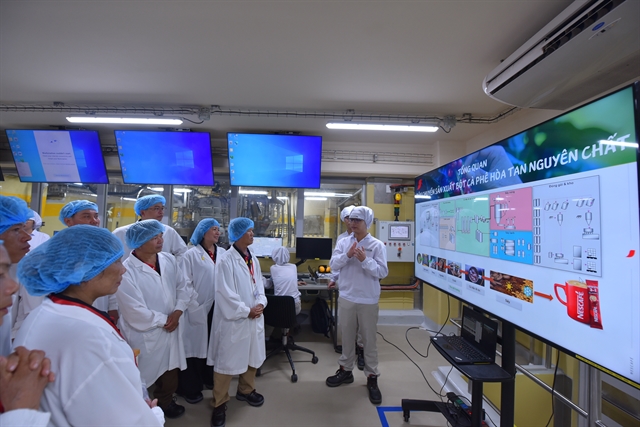Nestlé Vietnam recently hosted the 'Vietnamese coffee bean story' programme at the Nestlé Trị An factory, one of the world’s largest and most advanced coffee processing facilities. This initiative aims to deepen coffee farmers' understanding of processing techniques and enhance the value of Vietnamese coffee beans.

Nestlé Vietnam recently hosted a 'Vietnamese coffee bean story' programme at the Nestlé Trị An factory, one of the world’s largest and most advanced coffee processing facilities. This initiative aims to deepen coffee farmers' understanding of processing techniques and enhance the value of Vietnamese coffee beans.
As part of the NESCAFÉ Plan, 50 of the programme’s top farmers were invited for a study tour at the factory. During the visit, they learned about cutting-edge coffee processing technologies, sampled various coffee products and engaged with Nestlé employees working in the facility.
Phạm Phú Ngọc, NESCAFÉ Plan Programme Manager at Nestlé Vietnam, said: “This is the first time we have organised a tour for farmers who have supported the NESCAFÉ Plan for over 13 years. It’s an opportunity to thank them and help them realise how significantly their dedication contributes to the success of the NESCAFÉ Plan and the sustainable development of the Vietnamese coffee industry.”
The event also highlights Nestlé’s commitment to aiding farmers in transitioning to sustainable farming practices, improving their livelihoods and enhancing the global competitiveness of Vietnamese coffee.
“We hope that after this visit, farmers will feel proud of their contributions and continue to advocate for green agriculture, further solidifying Việt Nam’s position as a leading producer and exporter of high-quality coffee,” he said.
Mai Thị Nhung, a participant and group leader in the NESCAFÉ Plan, said: “This is my first visit to a Nestlé coffee processing factory. I feel proud to see our coffee beans transformed into high-quality products for export. I will share this story with my fellow farmers to highlight the importance of sustainable farming practices.”
Since 2011, Nestlé has implemented the NESCAFÉ Plan in the Central Highlands, collaborating with the Ministry of Agriculture and Rural Development, the Central Highlands Agricultural and Forestry Science Institute and local Agricultural Extension Centres to support coffee farmers in regenerative agriculture.
To date, the programme has conducted over 355,000 training sessions on sustainable cultivation, assisted more than 21,000 farming households annually and distributed over 74 million high-yield seedlings capable of resisting pests and drought. This initiative has revitalised more than 74,000 hectares of aging coffee trees. By adopting regenerative practices, farmers have reduced irrigation water usage by up to 40 per cent, cut chemical fertilisers and pesticides by 20 per cent and increased their incomes by 30 to 100 per cent.
The programme has also established 274 farmer groups, over 30 per cent of which are led by women, providing them with professional training to inspire their communities in sustainable agricultural practices.
In May 2024, Nestlé will release the second NESCAFÉ Plan 2030 Progress Report, which will showcase the growing adoption of regenerative practices that enhance productivity, lower greenhouse gas emissions and demonstrate Nestlé's commitment to sustainable coffee development, improved farmer livelihoods and a greener, low-emission agricultural future. — VNS
- Tags
- Nestlé Vietnam





